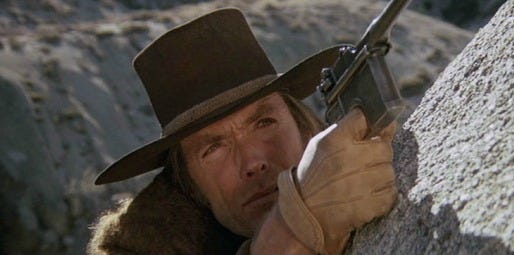Joe Kidd (1972)

Later generations knew Elmore Leonard primarily as a novelist whose books often were turned into movies ("Out of Sight," "Get Shorty"), but during the 1970s and '80s he was fairly busy writing original screenplays. This includes, God help him, "High Noon, Part II: The Return of Will Kane," starring Lee Majors in the Gary Cooper role.
Goes to show that even the best of us sometimes do stuff just for a paycheck.
In that vein, I'm not sure what to make of "Joe Kidd," a 1972 Western actioner starring Clint Eastwood. By all accounts, Leonard was inspired by a real-life movement by Mexicans to reclaim their ancestral lands from Anglo hands, which led to the storming of a New Mexico courthouse. Leonard switched it around to the turn of the century in fictional Sinola County and introduced the main character, a former bounty hunter who gets caught up in the conflict between Mexican revolutionary Luis Chama (John Saxon) and rich land baron Frank Harlan (Robert Duvall).
In 1972, Eastwood was so big he practically had his own gravitational pull, so I have no doubt the story got shifted around considerably from its original script. Although it starts out on a twist, with Kidd dressed up like a dandy and rotting in jail for a drunken binge, he soon takes on the prototypical Eastwood mantle: a man of few words and considerable skill at killing ... and humiliating others.
Plot-wise, there's not much there there. Chama rides into town and briefly holds the sheriff (Gregory Walcott) and judge hostage, burning up the deeds held by settlers to what they claim are their land. A posse is formed to catch him and his gang, but returns unsuccessful — largely due to the absence of Kidd, a seasoned tracker.
Harlan arrives with a large entourage of men carrying high-end rifles with scopes and other newfangled weapons. He takes over the entire second floor of the hotel, throwing out the existing guests in the process, and tries to enlist Kidd as his guide for $500. Sensing a murderers' row, he declines. But upon learning that Chama raided his own farm of some horses, he returns and accepts the offer (after doubling the price).
Along their way, they encounter Helen (Stella Garcia), who participated in the courthouse invasion and would appear to be Chama's squeeze. Kidd keeps silent about his knowledge of her relationship to their quarry, apparently willing to go along so he can get his own revenge on Chama and collect $1,000 in the process.
But when they happen across a small village of Mexicans, Harlan takes the entire town hostage and threatens to shoot five people every few hours until Chama gives himself up. The egotistical Chama refuses to do this, claiming their movement will die with them, but Kidd "convinces" him to turn himself into the sheriff, offering his help to get him there safely. This leads to the final, inevitable and rather dull shootout.
Kidd has a tendency to get into hassles over nothing, which keep coming back to bite him. He assaults another prisoner while in jail because the man refused him coffee during his hangover, and later has to kill him when it comes back on him. (He turns out to be one of Chama's man, another reason for tension between them.)
He also has a running feud with Lamarr, one of Harlan's junior flunkies, played by Don Stroud. Lamarr, referred to as "Kid" by his fellows, is a hot-headed ingrate whose combat skills aren't on par with his ability to antagonize. He carries around a fancy repeating pistol to which he can attach a wooden stock to turn it into a serviceable long-distance rifle. Kidd, after showing up Lamarr several times and finally dispatching him for good, uses it to scatter Harlan's men while making good his escape.
(The Internet Movie Firearms Database, with which I have recently become acquainted, claims this to be a C96 "Broomhandle" Mauser, and also that it can only hold a 10-round clip — though the movie depicts it as being able to spray an entire village several times.)
There's also a totally superfluous love interest played by Lynne Marta, Harlan's kept woman whom he keeps around for sex. There's a funny, goofy scene where she and Kidd meet in the hotel, and he just saunters into her room and starts kissing her with barely a few words passing between them. I know Eastwood was a big sex symbol 40 years ago, but you've got to at least provide some semblance of an invitation before you start mackin' on the ladies. Otherwise, it's just creepy.
Director John Sturges knew a thing or two about Westerns ("The Magnificent Seven"), but his and Leonard's storytelling skills are strangely flat here. None of the characters really makes any sort of impact; Chama only gets a couple of dialogue scenes, Duvall gives Harlan a sort of matter-of-fact ruthlessness that's not really hateful and Kidd is just another empty vessel for Eastwood to inhabit with his squinty glares and pistol-work.
By Leonard's own account, the actors were intimidated by the legendary director and didn't initiate any of the regular push-and-pull of the collaborative filmmaking process. Personally, I don't think Leonard just wanted to admit that his script stank. According to legend, the finale where Kidd drives a train through the Sinola saloon was a lark suggested by a producers as a joke and not part of anyone's plan.
I believe it because to watch the film it's hard to believe there was ever much of a scheme at all.
3 Yaps



